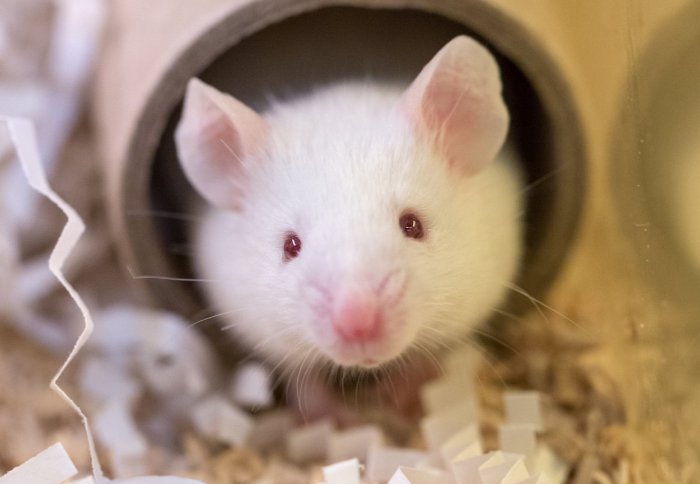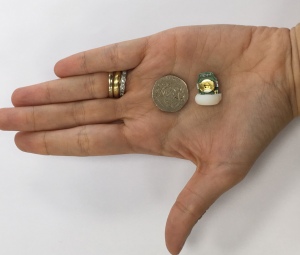Dementia and brain research could be improved thanks to new sensor
by Colin Smith

Scientists have improved the way that brain activity data is collected in mice, which could advance dementia and brain research.
The research, published today in the journal Nature Scientific Reports, describes a new ultra lightweight wireless sensor system for recording neural activity in the brains of mice.
The TaiNi sensor system also avoids many of the welfare concerns associated with existing approaches to recording brain activity in mouse models.
Constantly improving the welfare of the animals that make life-saving research possible is absolutely essential and it is something that the UK research community is working hard to do.
– Professor Esther Rodriguez Villegas
Department of Electrical and Electronic Engineering
TaiNi has been developed by engineers at Imperial College London in collaboration with the pharmaceutical company Eli Lilly, in their UK research labs. The research was funded by the National Centre for Replacement Refinement Research’s (NC3R) open innovation programme called the CRACK IT Challenge.
An electroencephalogram (EEG) is a test that detects electrical activity in a brain using small, flat metal discs called electrodes. Brain cells communicate via electrical impulses and are active all the time. This activity shows up as wavy lines on an EEG recording.
EEG recordings are typically conducted in mice to understand neural activity and how it relates to specific behaviours or cognitive tasks such as memory, learning and decision-making.
These studies are relevant for understanding brain disorders like schizophrenia and Alzheimer’s disease, and typically involve the use of wireless recording devices on the mouse’s head.
However, conventional technologies are heavy for the mice to carry and have limited battery life. Alternative approaches involve tethered recording systems, which restrict the mouse’s movement and the testing paradigms they can be used in.
Improving animal welfare
In 2011, NC3Rs and Lilly challenged the scientific community to develop a lightweight EEG recording device that could be used in awake, freely moving unrestrained mice, including in a range of behavioural tests. The aim of the project was to address the animal welfare and technical issues associated with existing recording systems.

The TaiNi device (pictured next to the 20 pence piece) is smaller and lighter compared to conventional sensor technology.
The £500k contract to solve the Challenge was won by Professor Esther Rodriguez-Villegas, from the Department of Electrical and Electronic Engineering at Imperial. Her research focuses on low power healthcare applications such as wearable sensors.
Professor Rodriguez Villegas said: “Animal research is absolutely vital if we are to solve the world’s most pressing health challenges. At the same time constantly improving the welfare of the animals that make life-saving research possible is absolutely essential and it is something that the UK research community is working hard to do.
“This has been an incredibly exciting and challenging project pushing the boundaries of microelectronics design and applying it in a truly novel area for us. The project has been a great example of the importance of radical thinking to find solutions to research problems which will have a massive impact. It has demonstrated that the best solutions often come from unexpected sources and the CRACK IT scheme from the NC3Rs is a great example of how to make this happen.”
The TaiNi device
This has been one of the most rewarding projects I've ever participated in, and it is genuinely exciting from a scientific and 3Rs perspective.
– Dr John Huxter
Principal Pharmacologist, Lilly
The TaiNi device pushes the boundaries of low power electronics in terms of its size, weight, battery life and signal bandwidth. It has the potential to be transformative both in pharmaceutical and academic research for the study of neural networks.
The wireless low power device, which weighs just 1.5g, has been trialled in studies at Lilly. It is capable of 72 hours recording from 16 channels and of capturing all types of neural activity from mice performing a range of tasks in a variety of environments, with data synchronisation to behaviour with sub-second precision.
Because of its high signal bandwidth, in addition to traditional EEG, TaiNi can also monitor networks of individual neurons in the brain. This greatly increases the amount of information gathered from each mouse every time a recording is made.
The benefits of TaiNi
The device will soon be available to purchase ensuring that the animal welfare benefits compared to other recording devices are maximised.
– Dr Anthony Holmes
Head of Technology Development at NC3Rs
The animal welfare benefits include maintaining the normal repertoire of movement and behaviours which are not possible with other wireless and tethered systems. Importantly, recordings using the TaiNi device can now be taken in automated testing areas linked to the animal’s home cage, where mice have a choice of when they perform behavioural tasks, with the advantage of avoiding repeated handling that can be stressful. Such studies could not be performed with tethered mice.
Dr John Huxter, Principal Pharmacologist at Lilly and industry lead for the Cognition Challenge, said: “This has been one of the most rewarding projects I've ever participated in, and it is genuinely exciting from a scientific and 3Rs perspective. The TaiNi device is a transformative technology which will open up entirely new areas of investigation and understanding in many brain disorders such as dementia and Alzheimer’s disease."
Dr Anthony Holmes, Head of Technology Development at NC3Rs, added: “The TaiNi device shows the importance of taking multi-disciplinary approaches to tackling 3Rs challenges. The device will soon be available to purchase ensuring that the animal welfare benefits compared to other recording devices are maximised.”
Article text (excluding photos or graphics) © Imperial College London.
Photos and graphics subject to third party copyright used with permission or © Imperial College London.
Reporter
Colin Smith
Communications and Public Affairs